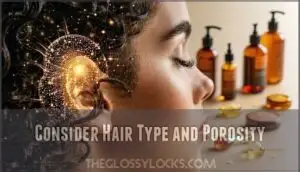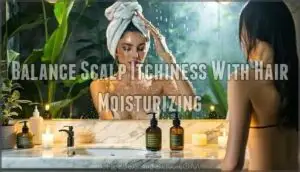This site is supported by our readers. We may earn a commission, at no cost to you, if you purchase through links.

The best products for itchy scalp target the root cause, not just the symptoms.
Ketoconazole shampoos like Nizoral tackle fungal overgrowth, while salicylic acid treatments dissolve flaky buildup that’s driving you crazy.
Coal tar shampoos work wonders for stubborn psoriasis, and gentle scalp oils can soothe inflammation without weighing down your hair.
The trick isn’t finding one miracle product—it’s matching the right treatment to your specific scalp issue, whether that’s seborrheic dermatitis, contact allergies, or simple dryness.
Table Of Contents
- Key Takeaways
- Causes of Itchy Scalp
- Top 8 Itchy Scalp Products
- 1. Nizoral anti dandruff shampoo ketoconazole
- 2. Salicylic Acid Scalp Treatment Shampoo
- 3. Salicylic Acid Dandruff Shampoo Treatment
- 4. Kerastase Dandruff Scalp Exfoliating Scrub
- 5. Salicylic Acid Clarifying Shampoo Formula
- 6. Scalp Detox Oil for Hair
- 7. Tar shampoo for dandruff treatment
- 8. Olaplex weightless dry shampoo spray
- Choosing Right Itchy Scalp Treatment
- Natural Remedies for Itchy Scalp
- Maintaining Healthy Scalp
- Frequently Asked Questions (FAQs)
- What is the best dandruff treatment for itchy scalp?
- What is the best shampoo for itchy scalp?
- What is the best scalp treatment shampoo?
- What are the best scalp treatments?
- How do you treat an itchy scalp?
- Should I use dry shampoo If I have an itchy scalp?
- What is the best thing to use for an itchy scalp?
- What do dermatologists recommend for an itchy scalp?
- How often should I wash itchy scalp?
- Can stress cause scalp itching problems?
- Conclusion
Key Takeaways
- Match your treatment to your specific scalp condition—ketoconazole shampoos work best for fungal overgrowth, while salicylic acid targets stubborn flakes and coal tar addresses psoriasis symptoms
- You’ll need consistency over product switching—give one targeted treatment 4-6 weeks to work before trying something else, as frequent changes prevent you from seeing real results
- Don’t overwash your scalp thinking it’ll help faster—medicated shampoos work best when used 2-3 times weekly and left on for 5-10 minutes before rinsing thoroughly
- Consider your hair type when choosing products—if you’ve got dry or chemically-treated hair, you’ll need to balance itch relief with moisturizing treatments to avoid stripping your hair’s natural oils
Causes of Itchy Scalp
Your itchy scalp isn’t just annoying—it’s your body signaling that something’s disrupting your scalp’s natural balance.
Understanding the root cause helps you choose the right treatment instead of just masking symptoms with temporary fixes, which is crucial for effectively addressing the issue, and right treatment can lead to a long-lasting solution.
Seborrheic Dermatitis and Yeast Overgrowth
Seborrheic dermatitis isn’t just simple yeast overgrowth—it’s your immune system overreacting to malassezia yeast that naturally lives on your scalp.
This fungal troublemaker breaks down oils, creating irritating byproducts that trigger scalp inflammation.
- Malassezia metabolizes sebum, releasing inflammatory fatty acids
- Immune system launches excessive response to yeast metabolites
- Disrupted skin barrier allows deeper irritant penetration
- Chronic inflammation creates persistent itchy flakes and dermatitis
Ketoconazole treatments target this root cause effectively. Researchers have made progress in understanding the skin barrier dysfunction associated with seborrheic dermatitis, which is a key factor in scalp inflammation.
Psoriasis and Immune System Response
Unlike yeast-related conditions, psoriasis stems from your immune system mistakenly attacking healthy skin cells.
This autoimmune reaction creates those telltale red patches with silvery scales that make your scalp itch like crazy.
When psoriasis triggers activate, they spark inflammation that accelerates skin cell turnover, causing thick, flaky buildup.
Your body’s defense system goes haywire, treating normal scalp tissue as a threat and launching skin flareups that demand targeted itchy scalp treatment.
Folliculitis and Infected Hair Follicles
When bacteria invade your hair follicles, they create painful, inflamed bumps that trigger intense scalp itch relief needs.
When hair follicles get infected, painful bumps erupt and your scalp screams for relief.
This follicle infection occurs when scalp bacteria penetrate damaged or clogged follicular openings. Folliculitis requires targeted medicated shampoo treatments with antifungal properties to eliminate infected roots and restore scalp health.
Understanding the relationship between hair growth phases is essential for effective treatment and prevention of scalp conditions.
- Bacterial invasion – Infected roots develop when harmful scalp bacteria enter compromised hair follicles
- Inflammation response – Your immune system creates red, tender bumps around affected follicles
- Treatment approach – Antifungal properties in specialized shampoos target both fungal infections and bacterial overgrowth
Contact Dermatitis and Allergens
Contact dermatitis develops when your scalp encounters allergens or irritants, triggering inflammatory allergic responses.
Common dermatitis triggers include hair dyes, shampoos, styling products, and fragrances.
Identifying specific irritant reactions helps with allergen avoidance, while anti itch shampoo and itch relief products manage symptoms until skin sensitivity subsides.
| Common Allergens | Symptoms | Relief Options |
|---|---|---|
| Hair dyes (PPD) | Red, swollen patches | Ammonia-free alternatives |
| Fragranced shampoos | Burning, stinging sensation | Fragrance-free products |
| Preservatives | Persistent itching | Gentle, hypoallergenic formulas |
| Sulfates | Dryness, flaking | Sulfate-free cleansers |
| Essential oils | Contact rash | Patch testing before use |
Eczema and Dry, Itchy Scaly Areas
Scalp eczema creates a perfect storm of dry, itchy flakes that can make you feel like you’re constantly fighting your own skin.
This chronic condition affects sensitive skin areas, causing persistent scalp irritation that demands targeted itchy scalp treatment.
Key characteristics of scalp eczema include:
- Persistent dryness – Your scalp becomes parched, leading to uncomfortable tightness and flaking
- Inflammatory patches – Red, scaly areas develop that worsen with scratching or harsh products
- Barrier dysfunction – Your skin’s protective layer weakens, making it vulnerable to irritants and moisture loss
Effective dry scalp solutions focus on gentle, fragrance-free formulations that restore your scalp’s natural barrier while addressing scalp itch causes with soothing ingredients.
Top 8 Itchy Scalp Products
When you’re dealing with persistent scalp itchiness, the right treatment products can provide significant relief from symptoms like flaking, irritation, and inflammation.
These eight dermatologist-recommended solutions target different underlying causes, from fungal overgrowth to excessive oil production, helping you find the most effective approach for your specific scalp condition.
1. Nizoral anti dandruff shampoo ketoconazole
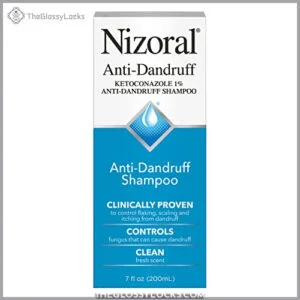
Dermatologists consistently rank Nizoral A-D Anti-Dandruff Shampoo as their top choice for tackling stubborn scalp itch.
You’ll find ketoconazole 1% working like a targeted missile against Malassezia yeast—the culprit behind most dandruff cases.
Clinical studies prove it’s 10X more effective than leading competitors at eliminating scalp fungus.
Use it twice weekly, massaging into wet hair for 3-5 minutes before rinsing, as it’s gentle enough for color-treated hair while delivering serious antifungal power that addresses root causes, not just symptoms.
Best For: Adults and teens seeking clinically proven, fast-acting relief from moderate to severe dandruff and scalp itching.
- Can cause dryness or irritation if overused or applied to sensitive areas.
- Relatively expensive for the amount provided.
- Not effective for bacterial or viral scalp conditions.
- Highly effective at reducing flaking, itching, and scaling due to ketoconazole 1%.
- Gentle formula suitable for color-treated and chemically processed hair.
- Long-lasting relief with only twice-weekly use.
2. Salicylic Acid Scalp Treatment Shampoo
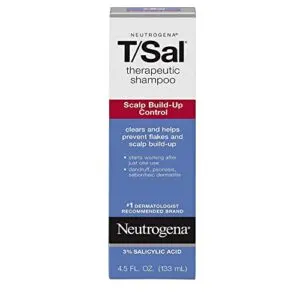
Therapeutic salicylic acid shampoos deliver targeted relief for stubborn scalp conditions.
The 3% concentration effectively breaks down thick, scaly buildup while reducing inflammation associated with psoriasis and seborrheic dermatitis.
Clinical studies show dandruff scores drop from 2.45 to 1.10 after four weeks of consistent use.
You’ll want to massage the formula into your scalp and let it work for several minutes before rinsing.
This keratolytic agent dissolves dead skin cells and product residue, providing hours of continued relief even after washing.
Best For: People struggling with stubborn scalp conditions like psoriasis, seborrheic dermatitis, or severe dandruff who need fast, targeted relief.
- Not a hair growth product and may need to be combined with other treatments for best results
- May cause dryness if overused or not followed with conditioner
- Lack of fragrance may be a drawback for those who prefer scented shampoos
- Clears scalp buildup, redness, and itching after just a few uses
- Unscented, gentle formula suitable for sensitive scalps
- Clinically proven to reduce dandruff and inflammation
3. Salicylic Acid Dandruff Shampoo Treatment
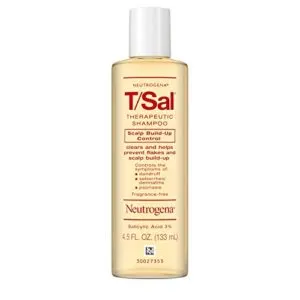
With its 3% salicylic acid formula, this therapeutic shampoo targets stubborn flakes by breaking down dead skin cells and unclogging hair follicles.
You’ll see visible results after just one use, as it continues working even after rinsing.
Clinical trials show 90.5% of users experienced only mild or no dandruff after four weeks of treatment.
The clarifying formula removes buildup while its anti-inflammatory properties soothe irritation, making it dermatologist-recommended for seborrheic dermatitis and scalp psoriasis management.
Best For: Adults with stubborn dandruff, scalp build-up, seborrheic dermatitis, scalp psoriasis, or persistent flaking and irritation who want fast, visible results.
- Effective at controlling stubborn flakes, soothing irritation, and unclogging scalp pores.
- Clinical studies show significant dandruff reduction and over 90% user satisfaction after four weeks.
- Unscented, free of added preservatives and color, and suitable for sensitive and color-treated scalps.
- Small bottle size and high cost-per-use may be a downside for frequent users.
- Clinical scent and liquid texture may not appeal to everyone, and may require follow-up moisturizing for thicker hair.
- Results can vary; may not completely resolve flaking for all users without rotation with other shampoos.
4. Kerastase Dandruff Scalp Exfoliating Scrub
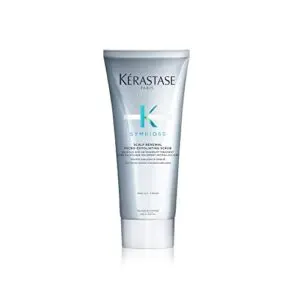
Beyond standard shampoos, this exfoliating scrub delivers deeper scalp purification with 2% salicylic acid and plant-based beads.
You’ll massage it into wet hair before shampooing, allowing the formula to remove dead skin cells and product buildup that regular cleansing can’t reach.
Clinical studies show 91% of users experience soothed scalps after use. The amber gel rinses clean without residue, making it suitable for twice-weekly application.
While pricier than alternatives, it effectively targets dandruff-causing cellular renewal cycles, providing a solution for those in need of a more potent scalp treatment with 2% salicylic acid.
Best For: People with sensitive, dry, or flaky scalps who need a deep, bi-weekly exfoliation beyond regular shampoo to combat dandruff and buildup.
- Deeply purifies and exfoliates the scalp, removing dead skin cells, buildup, and excess oil.
- Soothes itching and reduces visible flakes, supporting long-term scalp health.
- Gel formula rinses cleanly, leaving hair bouncy, soft, and manageable.
- Premium price point compared to similar scalp treatments.
- Requires thorough rinsing to remove all exfoliating microbeads.
- Screw-on packaging may be inconvenient to use in the shower.
5. Salicylic Acid Clarifying Shampoo Formula
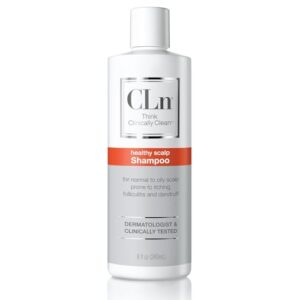
Clinical studies prove these clarifying formulas remove up to 100% of surface buildup while reducing dandruff severity by 90%.
You’ll find concentrations from 0.9% to 3% salicylic acid that penetrate deep to dissolve sebum and dead skin cells.
Use 1-2 times weekly, letting the formula rest several minutes before rinsing for maximum exfoliation. Higher concentrations provide intensive treatment for persistent scalp conditions, with 88% user satisfaction rates reported in dermatological studies.
Best For: People dealing with oily scalp, dandruff, seborrheic dermatitis, or folliculitis who want effective exfoliation and buildup removal.
- Clinically proven to remove up to 100% of buildup and reduce dandruff by 90%.
- Safe for sensitive and color-treated hair when used as directed.
- Recommended by over 10,000 doctors and dermatologists.
- Some users report a strong chemical smell that lingers after use.
- May cause dryness or irritation, especially with overuse or sensitive skin.
- The bottle size is smaller than expected for some users.
6. Scalp Detox Oil for Hair
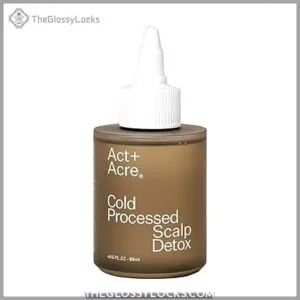
While traditional shampoos can strip your scalp’s natural oils, scalp detox oil works differently by dissolving buildup before cleansing.
Act+Acre’s Scalp Detox Oil contains baobab oil and basil leaf extract that remove 95% of product residue in one use.
Clinical studies show 93% of users experienced complete relief from itchiness within 15 days.
Apply weekly, massage for 20 minutes, then shampoo out, as it’s particularly effective for sensitive conditions like eczema and psoriasis.
Best For: Those seeking a gentle, plant-based solution for itchy, flaky, or sensitive scalps—including users with eczema, psoriasis, or persistent buildup.
- Clinically proven to remove 95% of scalp buildup in one use and relieve itchiness within 15 days.
- Hydrates and soothes with clean, vegan ingredients, free from harsh chemicals.
- Winner of multiple beauty awards and safe for color-treated hair.
- Price point is higher than many comparable scalp treatments.
- Some users experience a greasy or runny texture that requires adjusting use.
- Current packaging is not preferred by all, with requests for glass bottles.
7. Tar shampoo for dandruff treatment
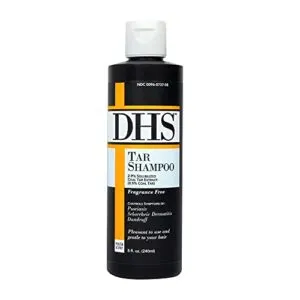
When stubborn dandruff won’t budge, tar shampoo steps in as your heavy-duty solution.
Coal tar works by slowing down excessive skin cell production that creates those pesky flakes.
Clinical studies show 0.5% coal tar shampoo effectively treats moderate to severe dandruff with high user approval ratings.
You’ll need to leave it on your scalp for several minutes before rinsing, and the strong odor dissipates once your hair dries.
Use twice weekly for best results, though improvement typically appears within six weeks of consistent use.
Best For: People with stubborn or severe dandruff, seborrheic dermatitis, or scalp psoriasis that haven’t responded to standard anti-dandruff shampoos.
- Strong tar odor that may be off-putting for some users.
- Can cause dryness; usually requires a follow-up conditioner.
- Not suitable for everyone—may discolor light hair or irritate sensitive skin.
- Clinically proven to reduce flakes, itching, and irritation.
- Recommended by dermatologists for hard-to-treat scalp conditions.
- Results often seen within six weeks of consistent use.
8. Olaplex weightless dry shampoo spray
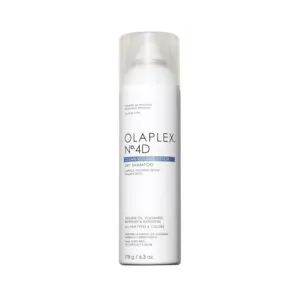
Breaking free from scalp buildup and irritation, OLAPLEX No.4D Clean Volume Detox Dry Shampoo offers a weightless solution for itchy scalps.
This vegan formula contains zeolite and bentonite to absorb excess oil without clogging pores, while rambutan seed extract provides antioxidant benefits.
Clinically proven to leave zero white residue, 97% of users reported cleaner-looking hair with reduced oil.
The pH-balanced formula detoxifies your scalp by neutralizing pollutants and impurities that trigger irritation, making it ideal for sensitive scalps seeking relief.
Best For: People with sensitive, itchy scalps who want a weightless, residue-free dry shampoo that refreshes hair and promotes scalp health.
- Clinically proven to leave no white or powdery residue
- Absorbs oil without clogging pores or causing buildup
- Vegan, pH-balanced, and free of common irritants, making it gentle for daily use
- May not control oil as effectively for very greasy hair
- Some users report packaging issues like damaged spray mechanism
- Higher price compared to some commercial alternatives
Choosing Right Itchy Scalp Treatment
Finding the right treatment depends on identifying your specific scalp condition and matching it with targeted ingredients.
You’ll need to balance treating the underlying cause while maintaining your hair’s moisture needs, especially if you have dry or chemically-treated hair.
Consider Hair Type and Porosity
Before selecting itchy scalp treatment, you’ll need to identify your hair’s unique characteristics.
Hair texture, scalp pH, and porosity levels determine which products work best.
Low porosity hair requires lightweight formulas that won’t weigh down strands, while high porosity hair needs protein-rich treatments.
Consider hair density and moisture balance when choosing scalp care tips for effective results.
Understanding scalp treatment benefits is essential for making informed decisions about your hair care routine and selecting the best scalp treatment.
Balance Scalp Itchiness With Hair Moisturizing
Finding the right scalp balance means addressing itch relief without compromising hair hydration.
Effective scalp health requires targeted itchy scalp treatment that won’t strip your hair’s natural moisture.
Here’s how to achieve ideal scalp moisturizers balance:
- Alternate Treatment Days – Use medicated dry scalp solutions 2-3 times weekly, following with hydrating conditioners to maintain hair moisture
- Focus Application Zones – Apply scalp hydration methods directly to roots while avoiding hair lengths with drying treatments
- Layer Your Routine – Combine natural itch relief products with moisturizing treatments, allowing scalp health benefits without sacrificing hair softness
Using natural relief remedies can help maintain a healthy scalp and reduce itchiness.
Frequent Washing for Seborrheic Dermatitis
Unlike traditional scalp care approaches, seborrheic dermatitis requires daily medicated shampoo use during flare-ups.
You’ll need to wash with ketoconazole or zinc pyrithione formulas until symptoms subside, then reduce to every 2-3 days for maintenance.
This frequent washing strategy effectively reduces yeast counts and prevents relapse.
For best results, use a gentle medicated shampoo treatment that suits your scalp type.
| Phase | Frequency | Duration |
|---|---|---|
| Active flare-up | Daily washing | Until symptoms resolve |
| Early maintenance | Every 2-3 days | 2-4 weeks |
| Long-term prevention | 1-2x weekly | Ongoing |
| Severe cases | 5-6x weekly | As needed |
Natural Remedies for Itchy Scalp
When conventional treatments haven’t provided relief, natural remedies can offer gentle yet effective solutions for your itchy scalp concerns.
These time-tested ingredients work by addressing inflammation, removing buildup, and restoring your scalp’s natural balance without harsh chemicals.
Apple Cider Vinegar for Defoliation
Apple cider vinegar’s acidic properties naturally restore your scalp’s pH balance while providing gentle defoliation.
The acetic acid removes dead skin cells and product buildup that trigger itchy scalp remedies needs.
Mix equal parts ACV with water, apply post-shampoo for 20 minutes, then rinse.
This scalp exfoliation method offers antimicrobial benefits against dandruff-causing yeast, making it effective among natural remedies for scalp treatment products.
Using a high-quality apple cider vinegar product is essential for ideal results and to ensure you get the full benefits of the treatment.
Baking Soda Paste for Exfoliation
Baking soda creates an alkaline environment that gently lifts dead skin cells and balances your scalp’s pH levels.
Mix equal parts baking soda and water to form a paste, then massage it into damp hair for 10-15 minutes before rinsing thoroughly.
This natural exfoliation method helps remove stubborn flakes while soothing irritation.
Lemon Juice for Antiseptic Properties
Fresh lemon juice’s antiseptic properties make it a powerful weapon against fungal growth on your scalp.
The citric acid naturally combats dandruff-causing microbes while gently softening stubborn flakes.
Apply diluted lemon juice directly to affected areas, let it sit for ten minutes, then rinse thoroughly.
This natural antifungal remedy provides scalp relief without harsh chemicals, making it perfect for sensitive skin seeking gentle scalp soothing products.
Colloidal Oatmeal Rinses for Moisture
Colloidal oatmeal creates a protective barrier that locks moisture into your scalp while reducing inflammation.
This gentle remedy soothes irritated skin through its beta-glucan compounds, offering natural scalp relief without harsh chemicals.
Benefits of colloidal oatmeal rinses:
- Moisture Lock – Forms protective film preventing water loss
- Itch Prevention – Anti-inflammatory properties calm irritation
- Hair Hydration – Softens both scalp and hair strands
- Scalp Relief – Reduces redness and flaking naturally
Mix finely ground oats with warm water, apply for 10-15 minutes, then rinse thoroughly for ideal scalp health.
Using natural remedies for dry scalp conditions can also promote overall scalp health and reduce irritation.
Maintaining Healthy Scalp
Beyond choosing the right products, maintaining a healthy scalp requires consistent daily habits that prevent irritation before it starts.
You’ll need to balance proper nutrition, sun protection, and gentle care routines to keep your scalp comfortable and itch-free long-term.
Diet Rich in Protein and Soy
Beyond just topical treatments, your dietary choices can substantially impact scalp health.
Soy benefits include amino acids that strengthen hair follicles and reduce scalp sensitivity.
Protein intake from tofu, tempeh, and edamame supports keratin production while balancing sebum levels.
Healthy fats from omega-3 sources complement soy’s anti-inflammatory properties.
Nutrient balance prevents deficiencies that trigger itchy scalp conditions.
These dietary changes work alongside scalp health products for thorough relief.
A balanced diet rich in foods for health is essential for maintaining a healthy scalp and promoting hair growth.
Protect Scalp From UV Rays
Sun exposure can wreak havoc on your scalp, causing sunburn and accelerating aging.
Your hair provides minimal protection with only SPF 5-17, far below the recommended SPF 30.
Shield your scalp with these proven methods:
- Wide-brimmed hats – Your first line of defense against harmful UV rays
- Scalp sunscreen – Apply SPF 15+ to exposed areas and reapply every two hours
- UV-protective hair products – Choose leave-in conditioners and styling products with built-in sun filters
Regular Washing and Conditioning
Your washing routine forms the foundation of scalp health. Use gentle shampoos designed for sensitive skin, focusing on massaging your scalp rather than scrubbing harshly.
The best shampoo for itch contains ingredients like pyrithione zinc or ketoconazole. Follow with conditioning tips that target hair ends, not roots, preventing buildup while maintaining moisture balance for ideal scalp care.
Weekly Scalp Exfoliation and Massage
Scalp exfoliants and massage techniques work together to promote healthy scalp health by removing buildup and boosting circulation.
- Physical exfoliants: Use scrubs with salicylic acid twice weekly for oily scalps
- Massage oils: Apply warm coconut or jojoba oil before gentle circular motions
- Exfoliation tools: Try silicone brushes or wooden combs for even distribution
- Frequency: Limit sensitive scalps to biweekly treatments to prevent irritation
- Technique: Focus on temples and crown areas using fingertip pads, not nails
Frequently Asked Questions (FAQs)
What is the best dandruff treatment for itchy scalp?
Feeling like your scalp’s staging a rebellion?
Ketoconazole shampoos like Nizoral effectively combat dandruff-causing yeast, while pyrithione zinc options provide antifungal relief.
Use 2-3 times weekly, leaving on for five minutes before rinsing, for effective relief.
What is the best shampoo for itchy scalp?
DHS Zinc Shampoo works best for persistent itching, containing pyrithione zinc that targets fungal overgrowth. You’ll need contact time of 5-10 minutes before rinsing for maximum effectiveness against inflammation.
What is the best scalp treatment shampoo?
Ketoconazole shampoo like Nizoral A-D targets fungal overgrowth causing dandruff and seborrheic dermatitis. You’ll need consistent use twice weekly, leaving it on your scalp for several minutes before rinsing thoroughly.
What are the best scalp treatments?
Over 22% of stress-related scalp conditions improve with meditation.
DHS Zinc Shampoo works best for severe itching, while ketoconazole shampoos target fungal causes.
You’ll need salicylic acid treatments for flaking and gentle serums for daily relief.
How do you treat an itchy scalp?
You can tackle itchy scalp by using medicated shampoos with ketoconazole or zinc pyrithione twice weekly.
Massage gently, leave on for five minutes, then rinse thoroughly.
Avoid overwashing and harsh products.
Should I use dry shampoo If I have an itchy scalp?
Looking at this backwards, dry shampoo might backfire on your itchy scalp.
It can clog pores and create product buildup, which actually worsens irritation and inflammation.
Skip it until your scalp calms down, as using it can lead to inflammation.
What is the best thing to use for an itchy scalp?
Medicated shampoos with ketoconazole or zinc pyrithione effectively combat fungal overgrowth causing your itch. Use salicylic acid for gentle exfoliation. If symptoms persist beyond several weeks, consult a dermatologist.
What do dermatologists recommend for an itchy scalp?
Dermatologists typically recommend ketoconazole shampoos like Nizoral for fungal causes, salicylic acid treatments for flaking, or zinc pyrithione formulas. They’ll suggest medicated options targeting your specific condition.
How often should I wash itchy scalp?
Wash your itchy scalp 2-3 times weekly with medicated shampoo.
Daily washing helps seborrheic dermatitis, while overwashing strips natural oils and worsens dryness.
Let treatment shampoos sit 5-10 minutes before rinsing.
Can stress cause scalp itching problems?
Stress acts like a match lighting the fire of scalp inflammation.
When you’re stressed, your body releases hormones that can trigger conditions like psoriasis and seborrheic dermatitis, causing persistent itching and flaking.
Conclusion
Sarah thought her persistent scalp itching was just stress until her dermatologist diagnosed seborrheic dermatitis.
Finding the best products for itchy scalp requires matching treatments to your specific condition.
Ketoconazole shampoos combat fungal overgrowth, while salicylic acid dissolves stubborn flakes. Coal tar addresses psoriasis symptoms effectively.
Remember, consistency matters more than switching products frequently. Start with one targeted treatment and give it 4-6 weeks to work. Your scalp will thank you for the patience.
- https://www.betterhealth.vic.gov.au/health/conditionsandtreatments/dandruff-and-itching-scalp
- https://www.nbcnews.com/select/shopping/best-itchy-scalp-treatments-ncna1303270
- https://www.healthline.com/health/home-remedies-for-itchy-scalp
- https://winstonsalemdermatology.com/scratching-the-surface-7-dermatologist-approved-itchy-scalp-treatments/
- https://www.headandshoulders.co.in/en-in/healthy-hair-and-scalp/scalp/itchy-scalp-remedy-and-treatments/home-remedies-for-itchy-scalp-and-hair

